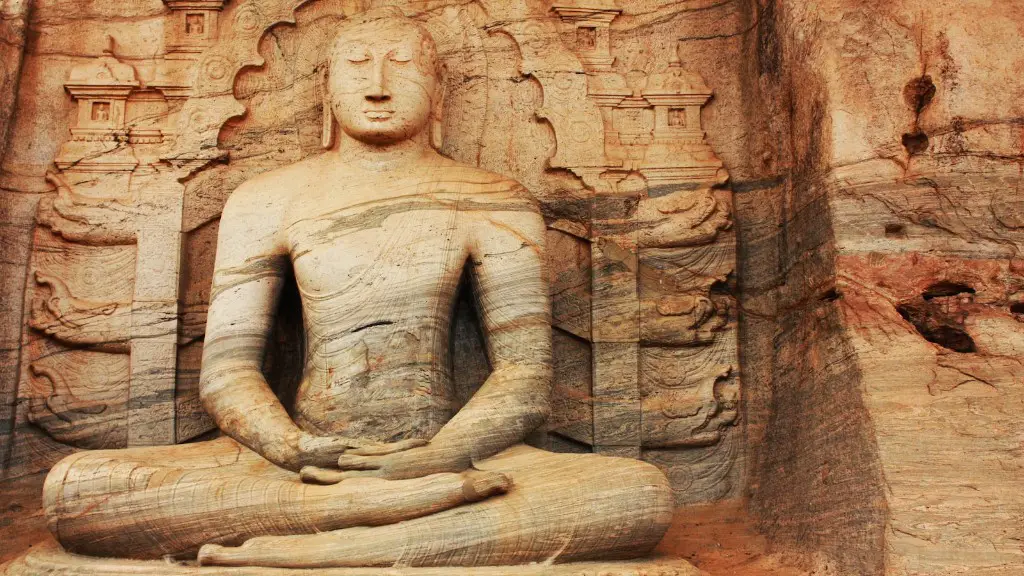Origins
Buddhism and Hinduism are two distinct religious and spiritual traditions that have their roots in ancient India. Buddhism was founded by Siddhartha Gautama, also known as the Buddha, who lived in India around the 5th century BC. Hinduism is one of the most ancient religious traditions in the world and is generally accepted to have been established sometime around 3000 BC by the Aryans, an ancient nomadic people who settled in the Indus Valley. Both religions have common roots in the Vedic and Upanishadic religious beliefs and practices of the ancient Vedic Aryans, though Buddhism and Hinduism evolved separately.
Beliefs
The fundamental difference between Buddhism and Hinduism lies in their respective beliefs and practices. Buddhism is a nontheistic religion, meaning it does not have a deity or supreme being as its focus. Rather, it focuses on the teachings of the Buddha, which are based on the principles of impermanence, suffering, and enlightenment. On the other hand, Hinduism is a polytheistic religion that venerates a variety of gods and goddesses. In addition, Hinduism is an extension of the Vedas, which are the ancient scripts of Hinduism, and discusses the relationship between this world and the samsara, the cycle of death and rebirth.
Practices
When it comes to specific practices, Buddhism and Hinduism have some similarities, such as the practice of meditation and doing good deeds, but also many differences. Buddhism encourages followers to free themselves from the cycle of birth and death by cultivating compassion for all living beings and accepting impermanence. Hinduism generally encourages followers to live a good and moral life and to perform rituals and worship deities; this worship and devotion to deities can bring blessings and spiritual advancement.
Philosophy
Further, Buddhism and Hinduism both have different philosophies. Buddhism is based on the Four Noble Truths and the Noble Eightfold Path, which focuses on the idea that suffering and dissatisfaction can be overcome and that true happiness can be attained through a spiritual journey. On the other hand, Hinduism is based on the Vedas and the practice of Dharma, which is the moral and ethical code of conduct by which Hindus must live their lives.
Achievement of Enlightenment
The most significant difference between these two religions is their beliefs about achieving enlightenment. Buddhism is centered around the goal of achieving Nirvana, a state of bliss and complete liberation from all suffering, through following the 4 noble truths and the 8-fold path. Hinduism, however, does not focus on achieving Nirvana, but instead places emphasis on striving toward liberation from the cycle of death and rebirth known as the samsara. The ultimate aim of Hinduism is to reach Moksha, a state of oneness with Brahman, the ultimate reality.
Festivals and Celebrations
Festivals and celebrations are a common feature of both Buddhism and Hinduism. Hindus celebrate a variety of festivals throughout the year, including Holi, Diwali and many more. Buddhists celebrate the major events of their founder’s life such as his birth, enlightenment and death. In addition, there are certain festivals unique to Hinduism and Buddhism, such as Vesak, a Buddhist festival that commemorates the birth, enlightenment and death of the Buddha, and Navaratri, a Hindu celebration that celebrates the changing seasons and the goddess Durga.
Interaction With Other Religions
Finally, Buddhism and Hinduism interact differently with other religions. Buddhism has become a global religion and is embraced by people from all walks of life across many cultures, including those in East and Southeast Asia. Hinduism, however, is mainly confined to India and other parts of South Asia and is mostly followed by those of that cultural heritage. Although both religions recognize some of the same deities and celebrate many of the same festivals, each religion has its own unique traditions that set it apart from the other.
Worship and Prayers
Buddhism and Hinduism have differing views on worship and prayer. Buddhism is generally seen as more of a philosophy than a religion, and as such, it typically does not involve worship or prayer in the traditional sense. Buddhists instead recite the Three Refuges and the Five Precepts as part of their practice. On the other hand, Hinduism is more in line with a traditional religion and includes worship of gods and goddesses as well as prayer and recitation of mantras and scriptures.
Sacrifice
Sacrifice, also known as yajna, is a practice that is observed in both Buddhism and Hinduism. In Buddhism, yajna is a ceremony to honor the enlightened beings of the past or to express gratitude or joy. In Hinduism, however, yajna is an elaborate ritual containing chanting, offering food to gods, and the burning of fire or other forms of sacrifice.
Ritual Practices
Ritual practices are also a common feature of both religions. Buddhism generally focuses on meditation, prayers to the Buddha and chanting, while Hinduism has more elaborate rituals that involve worshipping deities, offering food and performing sacred ceremonies. Additionally, Hinduism has certain rituals related to birth and death, such as the Upanayana ceremony that marks a child’s entrance into learning and the Antim Sanskar ceremony that marks the end of an individual’s earthly life.
Symbolism and Rituals
The two traditions also differ in their use of symbols and rituals. Buddhists often use symbols such as the Dharma Wheel and the Bodhi Tree as reminders of the teachings of the Buddha. Hinduism, on the other hand, uses a variety of symbols such as the Swastika, the Trishul, and the Om. In addition, Hindus believe in the power of mantras and rituals to bring good fortune and ward off evil.
Cultural Impact
The religious beliefs and practices of Buddhism and Hinduism have had a profound impact on the culture of India. Buddhism is especially influential in art, literature, and philosophy, while Hinduism has strongly impacted Indian music, dance, and architecture. Both religions have also deeply influenced Indian society and values and have helped shape the country into the vibrant and diverse place it is today.
